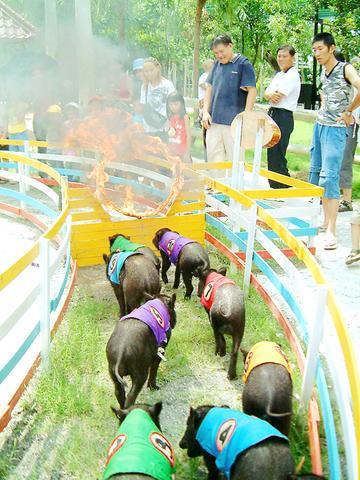Better laws regulating zoos are urgently needed because the habits and behavior of zoo animals reflect the decades of neglect they have been subjected to as the result of human-centered thinking, animal rights activists said yesterday.
Members of the Environment and Animal Society of Taiwan (EAST) screened a documentary at the Legislative Yuan yesterday to prove that some zoo animals suffer from neglect and abuse.

PHOTO: ENVIRONMENT AND ANIMAL SOCIETY OF TAIWAN (EAST)
Volunteers of the society spent two years shooting the documentary in zoos around the nation. In the film, a mangy Alaskan Brown Bear confined to a small room in the Kaohsiung Municipal Shou Shan Zoo has lost most of its fur.

PHOTO: ENVIRONMENT AND ANIMAL SOCIETY OF TAIWAN (EAST)
An orangutan housed at the same zoo jumps in place for hours at a time, while an elephant lies on the ground without being responsive to others' touching.
"We've seen too many cases involving abnormal animal behavior. Animals are treated cruelly in unnatural environments created by human-centered managers," said Chen Yu-min (
Chen said that zookeepers are supposed to be specialist animal caretakers, but many of them were unaware that their charges were sick until volunteers working on the documentary reported the illnesses to them.
"Zookeepers don't even notice the abnormal behavior of stressed animals," Chen said.
Chen said that unusual behavior is sometimes the first clue that an animal might be sick.
According to EAST, there are more than 100 animal centers in this country, including three major public zoos and two private ones. The Taipei Zoo, the largest in the nation, has more than 3,000 reptiles, amphibians and mammals of about 400 different species. Its annual income is more than NT$200 million.
The activists complained that zookeepers introduce rare species from abroad to attract more visitors without considering the problems posed by the inappropriate environment provided for the animals. Even worse, artificial breeding services are available in some private zoos, catering to buyers.
"Relocating wild animals to zoos [to satisfy curious people] is wrong. We should promote non-zoo education, which stresses the value of observing animals in the field without disturbing them," said EAST president Wu Hung (悟泓).
Wu Hung said that certain kinds of animals, such as polar bears and elephants, had been classified by Western conservationists as unsuitable for zoos. In Scotland's Edinburgh Zoo, he noted, a stone elephant was built a decade ago with a sign saying "You won't find a single elephant in this zoo except this one!"
Wu Hung said Edinburgh was evidence that animal conservationists in the West tried to inform people about human beings' inability to create a good environment in a zoo for certain animals.
Wu said that well-designed zoo laws are necessary if zoos have to exist, noting that examples of such laws can be found in the US, the UK, Canada, New Zealand, the EU, Australia, Colombia and India.
"We have to improve the zoo environment to make animals feel more comfortable," Wu said.
Democratic Progressive Party Legislator Shen Fu-hsiung (沈富雄) said he would work with his colleagues to draft laws to regulate zoos, adding, "The way we treat animals is an indicator of the degree of civilization in our society."
Li Ken-cheng (

Taiwan’s Liu Ming-i, right, who also goes by the name Ray Liu, poses with a Chinese Taipei flag after winning the gold medal in the men’s physique 170cm competition at the International Fitness and Bodybuilding Federation Asian Championship in Ajman, United Arab Emirates, yesterday.

Costa Rica sent a group of intelligence officials to Taiwan for a short-term training program, the first time the Central American country has done so since the countries ended official diplomatic relations in 2007, a Costa Rican media outlet reported last week. Five officials from the Costa Rican Directorate of Intelligence and Security last month spent 23 days in Taipei undergoing a series of training sessions focused on national security, La Nacion reported on Friday, quoting unnamed sources. The Costa Rican government has not confirmed the report. The Chinese embassy in Costa Rica protested the news, saying in a statement issued the same

A year-long renovation of Taipei’s Bangka Park (艋舺公園) began yesterday, as city workers fenced off the site and cleared out belongings left by homeless residents who had been living there. Despite protests from displaced residents, a city official defended the government’s relocation efforts, saying transitional housing has been offered. The renovation of the park in Taipei’s Wanhua District (萬華), near Longshan Temple (龍山寺), began at 9am yesterday, as about 20 homeless people packed their belongings and left after being asked to move by city personnel. Among them was a 90-year-old woman surnamed Wang (王), who last week said that she had no plans

TO BE APPEALED: The environment ministry said coal reduction goals had to be reached within two months, which was against the principle of legitimate expectation The Taipei High Administrative Court on Thursday ruled in favor of the Taichung Environmental Protection Bureau in its administrative litigation against the Ministry of Environment for the rescission of a NT$18 million fine (US$609,570) imposed by the bureau on the Taichung Power Plant in 2019 for alleged excess coal power generation. The bureau in November 2019 revised what it said was a “slip of the pen” in the text of the operating permit granted to the plant — which is run by Taiwan Power Co (Taipower) — in October 2017. The permit originally read: “reduce coal use by 40 percent from Jan.